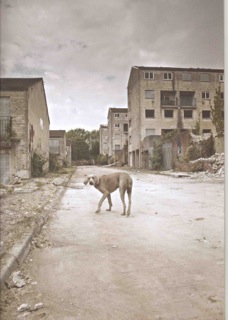At National Theatre Wales |
| National Theatre Wales- Coriolan/us , Hanger 858, RAF St Athan, Vale of Glamorgan , August 16, 2012 |
 Many theatregoers will recall visiting theatres with plush seats and gilded proscenium arches and being thrilled by the work of theatre art taking place on the stage; whilst many many such experiences will be profound and rewarding, the art happens ‘up there’. As soon as you enter the stark, grey interior of Hanger 858 the work of art is all around you. A perfect setting for this twenty first century production of this grey, desperate and thrilling work. We are quickly gifted with a stunning bouquet of the finest acting you could ever wish to see.
Many theatregoers will recall visiting theatres with plush seats and gilded proscenium arches and being thrilled by the work of theatre art taking place on the stage; whilst many many such experiences will be profound and rewarding, the art happens ‘up there’. As soon as you enter the stark, grey interior of Hanger 858 the work of art is all around you. A perfect setting for this twenty first century production of this grey, desperate and thrilling work. We are quickly gifted with a stunning bouquet of the finest acting you could ever wish to see.It is a very grey and desperate story with no one demanding our concern. Coriolanus is a Gaddafi, an Assad, when he is finally killed we would rejoice loudly but the drama of the moment produces a long silence all around the crowded, crumbling, grey shell. Richard Lynch’s brilliant portrayal of Coriolanus is a man with a black heart but within it lies a beat of sensitive charm which sometimes struggles to come out but always fails. We can hear a rasp of evil within his throat. The focus of the anger of the hungry, rioting citizens of Rome is Caius Martius/Coriolanus, a brilliant general who they blame for letting them starve by withholding stores of grain from them. Our spokesmen, for it soon become clear that it is the audience that forms the body of the oppressed underlings, are played with fervor and passion by John Rowley and Gerald Tyler. They speak the words of Bertolt Brecht’s twentieth century play Coriolanus, they blend perfectly with Shakespeare’s sixteenth century verse. The patrician and friend of Coriolanus Menenius Agrippa tries to calm the rioters. He is someone they almost trust. Mathew Thomas plays him with an engaging calm much in contrast to the warring shrill notes that permeate much of the play. The people are not taken in. Their representatives, the two tribunes Sicinius and Brutus take on the role of Coriolanus’ main adversaries in the early part of the action and indirectly set him off towards his tragic end. Nia Gwynne lets her deep hatred of the despicable ruler shine through her whole body, partnered by Chis Jared who with equal passion builds a subtle rapport between them that enhances their roles. They denounce Coriolanus as he goes off to defend Rome against the armies of Volscians. He captures the Volscian city of Corioles. His general Cominius dubs him the name Coriolanus. Cominius and his fellow general Titus Lartius are at all times standing firmly either side of Coriolanus. John Glynn and Brendan Charleson play strong and firm, the essence of reliability. When Richard Lynch’s Coriolanus meets his blood enemy Tullus Aufidius played by Richard Harrington we have the dynamism of two vital and determined voices from which the play draws its main strength, their face to face, breath to breath exchanges have a homoerotic touch which just indicates the complexity of character these two finely honed actors are able to produce. Back in Rome Volumnia, Coriolanus’ mother persuades her son to run for consul but the people, lead by Sicinius and Brutus rise up against him and he is banished from Rome. In a fit of spite Coriolanus persuades his bitter enemy Aufidius to join him in the sacking of Rome. Rhian Morgan vividly portrays the desperate anxiety of a mother having her insides rung out of her by the actions of her recalcitrant child. Bethan Witcomb, his beautiful wife Virgilia looks on it all with a quiet note of enigmatic and sad bewilderment. He returns to face Aufidius but this time the gods are against him. We, the people rejoice at our freedom but oppression will surely follow as it still continues throughout the world by the same evil men today. Directors Mike Pearson and Mike Brooks have come up with an almost flawless interpretation of this seldom performed play. This is a work that can be added to the growing list of iconic productions from the first two years of the National Theatre Wales’ existence, Pearson’s previous The Persians and the magnificent and hugely compelling The Passion, that set Port Talbot alight last year. |
Reviewed by: Michael Kelligan |
This review has been read 1948 times There are 95 other reviews of productions with this title in our database:
|
